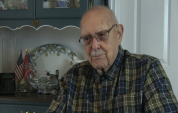5:05 | There was a lot of ingenuity in the captured flyers. Crawford Hicks describes the clever way that "clipped" wings were made from powdered milk cans, so they all had a distinctive insignia. He also tells how the men gave themselves an unlikely morale boost and how they got along with the German guards.
Keywords : Crawford Hicks Prisoner Of War (POW) Stalag Luft III Klim cans wings morale inspection German guard Hogan's Heroes

He didn't care for farm life, though the food his family grew was handy during the Depression. Crawford Hicks loved two things growing up, reading and airplanes. He badly wanted to fly, so when Pearl Harbor happened, he enlisted in the Air Corps.
As a new Air Corps cadet, Crawford Hicks began his training in a biplane and then progressed through a series of more powerful aircraft. His first instructor got rid of his fear with a bold maneuver and, despite his shaky landings at times, he got his wings and his 2nd Lieutenant bars.
The first time he saw the B-17, Crawford Hicks thought there was no way he could fly that thing. It was huge, but with patient instructors and lots of practice, he became proficient at it. The last stop in his training cycle was in Texas, where he learned the art of the bomb run.
Crawford Hicks had trained thoroughly as a B-17 pilot and had assembled his crew. It was quite a thrill for him as a 2nd Lieutenant to sign for a brand new aircraft and deliver it to England.
B-17 pilot Crawford Hicks flew his first mission as a co-pilot so he could get exposed to the flak. When it came up, he was scared, but he knew he had to get over it, and he did.
He had some close calls in his B-17, one of which left him with a hot souvenir, a piece of flak. Crawford Hicks recounts several of these incidents and tries to describe his calm state of mind, which got him through the missions. The officers received a glass of whiskey after the flights, but he always gave his to an enlisted man.
B-17 pilot Crawford Hicks was returning from his tenth mission when he spotted the German fighter coming in with guns blazing. The plane was crippled by hits on the engines so they had to bail out. After the others had jumped, he looked down through the hatch to the ground far below, then he fell.
The morning after his capture, B-17 pilot Crawford Hicks woke up in a German jail. After interrogation, he was sent to Stalag Luft III, the POW camp at which the "Great Escape" had occurred several months earlier. On his arrival, he was astounded when one of the guards addressed the arrivals with an unexpected accent.
The POW's were allowed to do whatever they wanted all day except for two roll calls. Crawford Hicks was kept in the same camp where the "Great Escape" had occurred and he describes some of the details of that incident and why he was ordered not to try to do the same.
The food was meager in the POW camp, but one of the men in the room with Crawford Hicks had been a cook and so they agreed to pool all they were given by the Germans, along with what they received in parcels, so that he could repurpose it into decent meals. The men relieved the monotony of camp life with lively talent shows.
They heard the Russian guns approaching from the East and it wasn't long before the men of Stalag Luft III were shipped on a train to Nuremberg. It was there in a freezing outdoor camp that Crawford Hicks saw his friend strip down in the snow to bathe at a water spigot. There was a good reason.
The end of the war was imminent, but the Germans were still marching POW's around the countryside. It was the forces of GEN George Patton that liberated the temporary camp where Crawford Hicks was listening to the approaching guns. Then started a whirlwind of activity for the newly freed Americans.
He was still eligible for the planned Japan campaign, but Crawford Hicks was relieved when the atomic bomb was dropped while he was on his honeymoon. He went back to school and though times were tough, he persisted and had a fulfilling career.
Crawford Hicks imparts some of the things he has learned in life from his experience as a pilot, a prisoner of war, a lawyer and a husband.